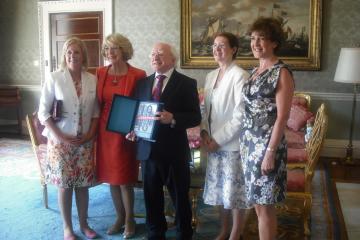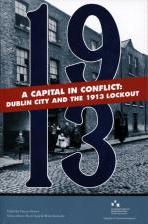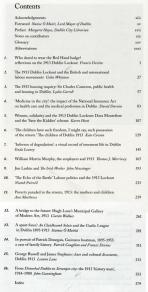1913 Dublin Lockout Publication - Presentation to the President
Published on 11th July 2013
 On Wednesday, 10th July 2013, the President, Michael D. Higgins, was presented with a copy of the publication, A Capital in Conflict: Dublin City and the 1913 Lockout".
On Wednesday, 10th July 2013, the President, Michael D. Higgins, was presented with a copy of the publication, A Capital in Conflict: Dublin City and the 1913 Lockout".
Image: President Michael D. Higgins and his wife Sabina Higgins being presented with a copy of the book by Margaret Hayes, Dublin City Librarian (on left), together with Dr. Máire Kennedy, Divisional Librarian and series editor (2nd from right), and Jane Alger, Director Office of Dublin UNESCO City of Literature (far right).
 The book was produced by Dublin City Public Libraries and launched on Saturday 13th April by the then Lord Mayor, Naoise Ó Muirí. The book, containing 16 essays written by both established and emerging historians, focuses on various aspects of Dublin in 1913.
The book was produced by Dublin City Public Libraries and launched on Saturday 13th April by the then Lord Mayor, Naoise Ó Muirí. The book, containing 16 essays written by both established and emerging historians, focuses on various aspects of Dublin in 1913.
Left: Book cover.
The book is distributed by Four Courts Press, so it is available in all bookshops and directly from Four Courts Press.
The book can also be borrowed through the Dublin City branch library system.
RTÉ Radio One’s History Show on 14th April devoted the whole programme to the book, and the podcast can be accessed online.
2013 marks the centenary of the 1913 Dublin lockout, and many events are taking place commemorating the happening and Dublin at that time.
Book Details
 Title: A Capital in Conflict, Dublin City and the 1913 Lockout
Title: A Capital in Conflict, Dublin City and the 1913 Lockout
Editor: Francis Devine
Series Editors: Dr. Mary Clark and Dr. Máire Kennedy
ISBN: Hbk 978-107002-11-3 Pbk 978-1907002-10-6
Pages: xxxi, 405pp.
Published by: Dublin City Council, 2013
About: A capital in conflict explores aspects of the social, political and cultural life of Dublin at a defining point in Irish history during the 1913 Lockout. Certain personalities loom large such as James Larkin and William Martin Murphy, Delia Larkin and James Connolly, Charles Cameron and Hugh Lane, but it is the ordinary people of the city, the children, women and men, who shine through the pages of this volume.
Contributors: Lydia Carroll, Patrick Coughlan, Kate Cowan, John Cunningham, Francis Devine, David Durnin, Karen Hunt, Leeann Lane, Enda Leaney, Ann Matthews, Thomas J. Morrissey, John Newsinger, Séamas Ó Maitiú, Niamh Puirséil, Ciarán Wallace, Colin Whitston.
Right: Table of Contents.
Historical Background
The Dublin 1913 Lockout began on 26th August 1913 when all the trams on O’Connell Street stopped with workers seeking pay rises ranging from 1s to 2s a week. William Martin Murphy, the owner of the Dublin Tramway Company locked out members of the IT&GWU who refused to sign the pledge and leave the union and James Larkin, leader of the union called a general strike. In the disputes that followed more than 20,000 workers were either locked out of their jobs by their employers or went on strike. Unrest had begun earlier in the year with the City of Dublin Steam Packet Company dispute in January and the Dublin Silk Weavers strike in March.
At the end of August, the city was in a state of unrest. On 30th August there were with riots in Ringsend, Beresford Place and Eden Quay, during which the police baton-charged the crowds. Many protestors were injured and one man died from his injuries. On 31st August, James Larkin appeared in the window of the Imperial Hotel, Sackville Street (now Clerys, O’Connell Street) to address the huge crowd. He was immediately arrested and a riot followed. The police baton charge caused over 300 injuries and the day is known as “Bloody Sunday” The Lockout continued for 6 months with families enduring widespread hardship, poverty and hunger and by early 1914 many of the workers were driven back to work. Housing conditions in Dublin at the time were very bad with the slums considered some of the worst in the UK. The 1911 census shows that 26,000 families in Dublin city lived in tenements, 20,000 of them in single rooms. The mortality rates per 1,000 were 22.3 in Dublin compared to 15.6 in London. On 2nd September, 7 people – including two children died when two tenements, numbers 66 and 67 Church Street collapsed. (Source: Dublin City Council)